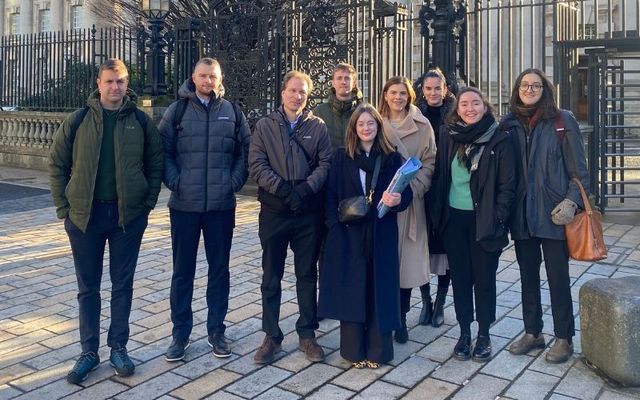Conradh na Gaeilge, the democratic forum for the Irish-speaking community, said that it believes the Irish language was officially spoken in Belfast Courts for the first time since the 18th century on Monday, January 15.
Several members of the Irish-language organization Conradh na Gaeilge introduced themselves through the Irish language at the beginning of their appeal related to a bilingual signage row, while several Conradh na Gaeilge witnesses also introduced themselves through Irish during the tribunal.
"It is likely this is the first time witnesses have officially used Irish in Courts in Belfast since the introduction of the 1737 Administration of Justice (Language) Act," Conradh na Gaeilge said on Monday.
Conradh na Gaeilge noted that The Language and Identity Act (2022) makes a statutory provision to repeal the ban on the use of Irish in court documentation, but it has not yet been triggered.
?Bhí @cnag ar ais sa Chúirt inniu i mBéal Feirste i gcomhar le @CAJNi & @PILSni, i gcoinne @belfastcc
?It is likely this is the first time witnesses have officially used Irish in Courts in Belfast since the introduction of the 1737 Administration of Justice (Language) Act. ⚖️ https://t.co/692GzTPUjN pic.twitter.com/MskUAJrPDZ
— Conradh na Gaeilge ⭕️ (@CnaG) January 15, 2024
Conradh na Gaeilge said its case, which is supported by The PILS (Public Interest Litigation Support) Project and represented by CAJ (Committee on the Administration of Justice), challenged a decision taken by Belfast City Council and subsequently upheld by the Information Commissioner refusing to disclose legal documentation which determined a legal test for a “call-in” by the DUP regarding bilingual signage at Olympia leisure center had been met.
The legal determination provided to Council was found to have met the threshold which suggests that bilingual signage could “disproportionately affect adversely” a “section of the inhabitants of the district”.
Belfast City Council subsequently refused to disclose this legal opinion following a Freedom of Information request from Conradh na Gaeilge.
Claire Donnelly, Principal of local Irish Medium primary and nursery school Scoil an Droichid, Seán Ó hEacháin, Head of Irish at Coláiste Feirste, Eoghan Ó Gormaile, Community Worker at Glór na Móna, and Cuisle Nic Liam, Language Rights Coordinator with Conradh na Gaeilge, all introduced themselves in Irish during Monday's Tribunal.
Speaking outside of the Tribunal on Monday, Cuisle Nic Liam, Language Rights Coordinator with Conradh na Gaeilge, commented: “We were incredibly disappointed when the DUP continued their long-running obstruction of Irish language rights and “called-in” a decision on bilingual signage in Olympia leisure center.

Love Irish history? Share your favorite stories with other history buffs in the IrishCentral History Facebook group.
"When the following legal opinion provided to Council was found to have met the threshold which suggests that bilingual signage could 'disproportionately affect adversely' a 'section of the inhabitants of the district,' we immediately requested a copy through a Freedom of Information Request. Belfast City Council refused to disclose those documents. That legal opinion effectively overturned a committee that had voted 12vs6 in favor of bilingual signage at Olympia.
“This legal opinion seriously impacts a community, and, by refusing to release that information, Belfast City Council has precluded the public from seeing the criteria and rationale by which a decision was ultimately taken to reject bilingual signage.
"We believe, given the ongoing consultation into this issue, and the broader debate around language rights, that legal determination directing council policy should be transparent and open to scrutiny and challenge.
"We hope, through this tribunal, that we can return to a culture of openness and transparency, and that future legal determinations sought, and paid for by the Council with rate-payers money, are made readily available to communities and citizens across the board.”
The Tribunal reserved judgment and hopes to deliver their judgment within three weeks.




Comments